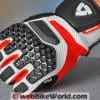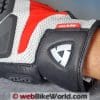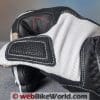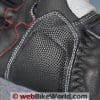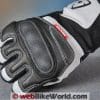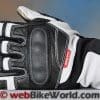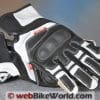The REV’IT! Sand Pro and Striker gloves are similar in both design and intended use.
They are two of five total off-road oriented short textile gloves offered by the Netherlands-based company for 2013.
The Sand Pro and Striker make for a good comparison because each has a particular set of advantages.
However, the Sand Pro gloves have a list price that is 30% higher than the Striker gloves — a definite factor in favor of the latter.
Both of these gloves sacrifice ultimate protection for excellent ventilation and that is the compromise that still hasn’t been conquered by glove manufacturers.
And both of these gloves are fairly expensive for what you get in terms of protection…however, you’re also getting tons of style and very nice construction.
Our favorite? In the end, we think the Striker gloves have a touch more protection with their hard main knuckle guard and all-leather palms.
Factor in the 30% list price difference in favor of the Striker gloves — along with their special “connect” fingertip feature to control touch screens, and we have a favorite.
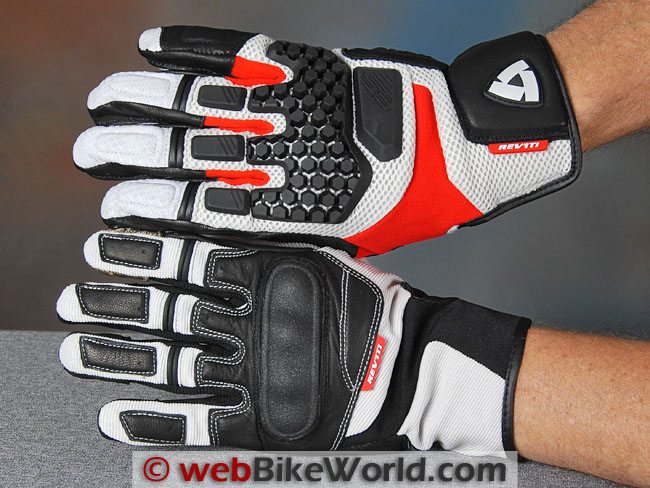
Introduction
REV’IT! has always offered a huge collection of motorcycle gloves, from full race types such as their top-of-the-line Jerez gloves (review) with a current list price of $379.99 to excellent winter and waterproof gloves like the Bastion GTX, Orion GTX and Alaska GTX gloves (reviews).
Another category that has featured prominently in the lineup is the REV’IT! collection of off-road oriented gloves like the new-for-2013 Sand Pro and Striker gloves.
The Sand Pro gloves sit at the top of the REV’IT! summer/off-road textile glove lineup, with a list price of $119.99. The Striker gloves are mid-range, with a list price of $79.99.
Both of these gloves are good-looking and nicely made and both have attractive features, making a choice very difficult indeed.
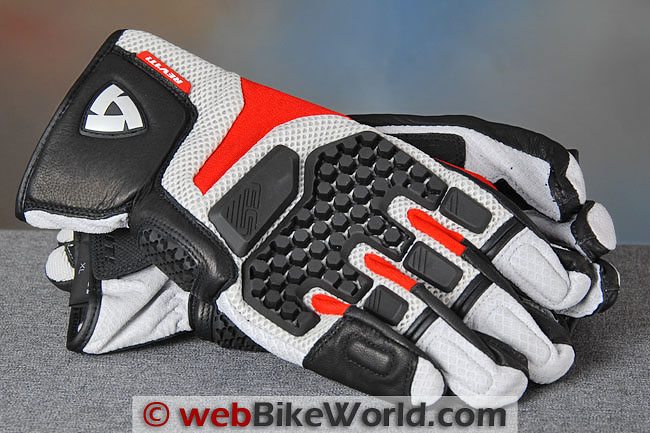
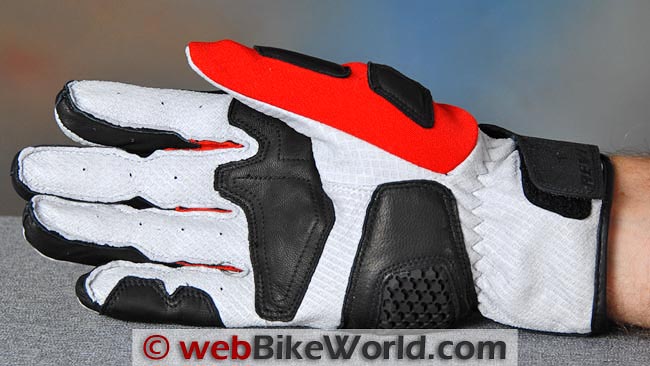
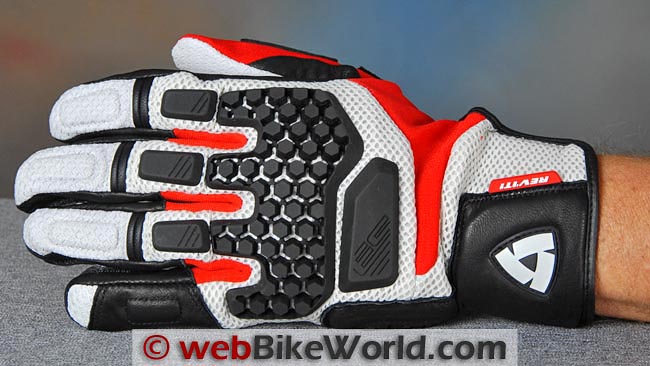
The REV’IT! Sand Pro Gloves
The Sand Pro gloves are about as unique as you’ll find in a textile off-road oriented motorcycle glove.
Their calling card is the “unique hexagon-shaped thermoplastic rubber (TPR) elements” which are injected right into the textile body of the glove to form the main knuckle protector.
This construction creates a very flexible cushion for the main knuckles and also allows air to flow between the 5 mm tall hexagons of rubbery material. It also means that wearing the Sand Pro gloves feels more like wearing a pair of fabric dress gloves than a protective motorcycle glove.
The only problem with this is that it’s difficult to know how much protection the mesh of rubber bumps will provide. We wonder if the bumps would quickly wear down to nothing if by chance they end up sliding along on the street.
But on the other hand (pun), since the Sand Pro gloves are focused on off-road riding, the rubbery mesh should provide better impact resistance if your hand slams into a rock on the trail.
The other main difference between the Sand Pro and Striker gloves is in the construction of the palm. The Sand Pro gloves use a strange-looking type of leather for the palms; it’s called “PittardsWR100X Hairsheep Diamond”.
What’s a “hair sheep”? Basically, a non-wool producing sheep whose genes go back to the original sheep types. Wooly sheep are a human-made invention through selective breeding over the centuries.
Why REV’IT! and Pittards chose hair sheep rather than goat or synthetic leather is unknown, but this is the first time we’ve seen it used in motorcycle gloves.
To be honest, we prefer the goatskin palms of the Striker gloves. It feels more natural than the highly worked hair sheep hide used in the Sand Pro gloves, which has an artificial feel (we thought it was synthetic leather until we investigated it further).
The Sand Pro gloves also have a solid TPR protector covering the outside of the “heel” of the hand. The TPR appears to be the same used in the hex main knuckle protector, but it is a solid molding on the palm.
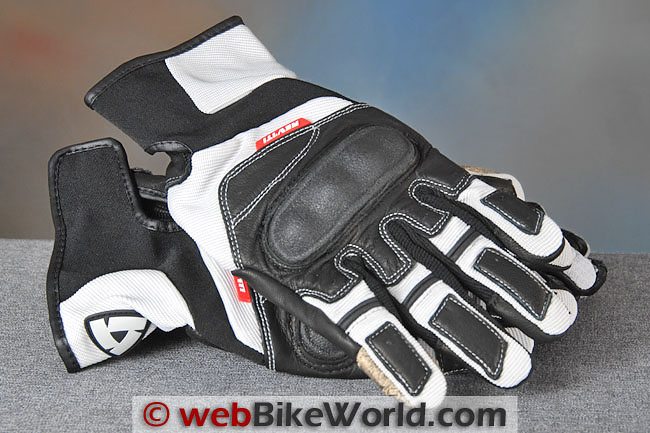
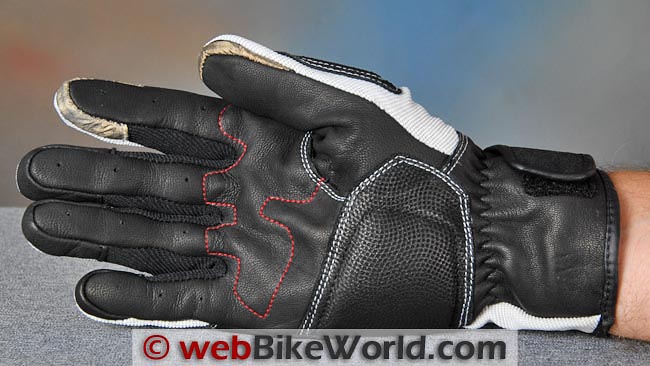
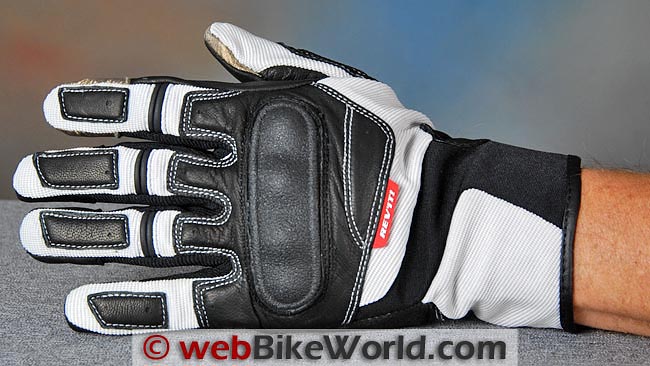
The REV’IT! Striker Gloves
The Striker gloves immediately biased our feelings, due to their lower list price.
The styling of the Striker gloves is more conventional…although if we hadn’t seen the striking (sorry) Sand Pro gloves, the Striker gloves would have gotten raves for their looks anyway.
Neither of these two are designed for street use, although there’s no reason why they couldn’t be worn on the street. But the protection on both is very limited compared to a true street-oriented glove.
However, the Striker gloves have a more traditional hard main knuckle protector, double-stitched on to a large leather section covering the upper part of the fingers and on to the back of the wrist.
The Striker gloves also have a full-length goat skin leather palm, along with a padded section that looks like Pittards “digital” leather, often found on motorcycle gloves. It is not listed as such in the official REV’IT! catalog, however.
While the hard main TPR (thermoplastic rubber) main knuckle protector on its leather backing certainly doesn’t provide the same levels of air flow as the open hexagon bumps on the Sand Pro gloves, the rest of the stretch mesh fabric on the Striker gloves does.
The Striker gloves also have one very important feature that is missing from the higher-priced Sand Pro gloves: the “connect” fingertip fabric on the forefinger and thumb.
This special gold-colored material allows the Striker gloves to be used with a touch screen, while the Sand Pro gloves can’t. This is illustrated in our video below and it’s an important feature for 2013-era motorcycle gloves.
Sand Pro vs. Striker Gloves Fit Comparison
Both of the gloves we reviewed are size XL. REV’IT! gloves, in our experience, generally seem to run a size or so small and that holds true for the Striker gloves, which fit much more like a size large. The Sand Pro gloves in size XL, however, do feel correct to size.
This makes it slightly difficult to compare the two, but the Sand Pro gloves seem to have a more generous finger fit; that is, the inside diameter of the fingers seems larger than the closer-fitting Striker gloves of the same size.
Both of these gloves are very comfortable and feel more like wearing a pair of BMX gloves than heavy leather motorcycle gloves.
Both also provide excellent air flow; in fact, about as much ventilation as you’re likely to find in a motorcycle glove that at least offers minimal protection.
It’s really difficult to pick a favorite, but we’re shaded slightly towards the fit of the Striker gloves with their closer fit and goat leather palms.
The Sand Pro gloves have the most comfortable fit across the top of the knuckles, but our size XL fits to size, which means it’s slightly too big and the finger fit is more generous than we’d prefer.
Of course, your fit and comfort criteria will vary, but the bottom line here is that both of these gloves are very comfortable with their stretch textile fabric, as long as you can deal with the minimal amount of street protection they provide.
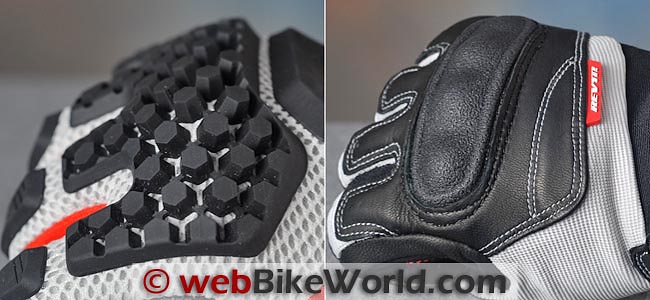
Sand Pro vs. Striker Gloves Fingertip Comparison
The fingertip construction is completely different on both of these gloves also.
The Sand Pro gloves having the two side “walls” meet in the middle of the fingertip with a seam on the outside, whilst the Striker gloves use a one-piece wraparound “wall” across the front of the fingertip.
Both gloves have partial leather around the sides of the fingertips, but the leather on the Sand Pro extends back farther, to about the center of the middle knuckle, while the leather on either side of the fingertips of the Striker gloves extends back to about the end of the tip knuckle.
The Sand Pro gloves use the hair sheep leather on the tops of the fingers, while the Striker gloves have mesh textile fabric with small padded leather patches sewn on top as a modest abrasion protector.
The outside of the thumb on the Striker gloves have what appears to be the Pittards digital leather double-stitched, while the Sand Pro gloves use the same type of minimal leather patches of the type found on the tops of the fingertips of the Striker gloves.
And don’t forget once more, the Striker gloves have the special “connect” material on the tip of the first finger and thumb, which allows these gloves to function with a touch screen device, such a a cell phone.
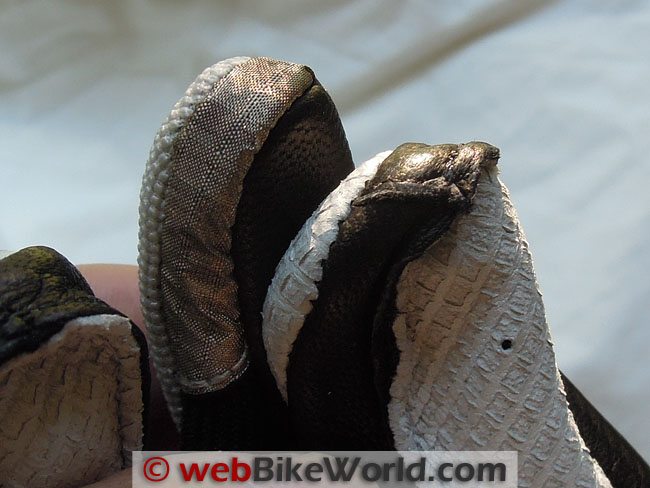
REV’IT! Sand Pro vs. Striker Gloves Gauntlet
Both of these gloves use the same type of wrist closure; a hook-and-loop strap that secures a split short gauntlet.
This design allows the gloves to fit comfortably under a lightweight motorcycle jacket, but neither wrist strap completely secures the gloves on the hand.
We are able to pull the gloves off the hands with the wrist strap secured, although in all fairness, it takes some force to do so. Some motorcycle gloves we have tried can be removed with almost no effort, so at least these are somewhat secure.
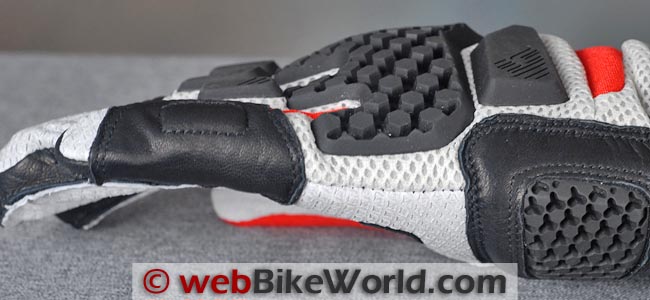
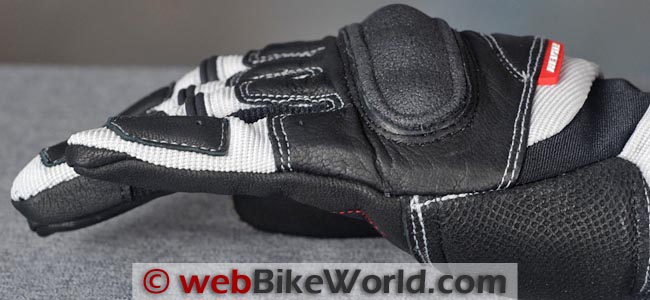
REV’IT Sand Pro vs. Striker Gloves Ventilation
Both of these gloves have excellent ventilation that is probably about as good as you’ll find in anything labeled as a motorcycle glove.
The Sand Pro gets the nod here, however, with its unique main knuckle protector design that allows a lot of air to flow through. This is a signature feature of the Sand Pro gloves not found on any other type of motorcycle glove we’re aware of.
But the Striker gloves are no slouch when it comes to ventilation either and both of these gloves have much better ventilation than just about any other motorcycle gloves we’ve tried (albeit at the expense of some protection).
Liner and Comfort
Both gloves use a thin liner on the inside. Without looking, we first assumed neither glove had a lining because the seams can be felt somewhat in each. But the thin black lining fabric probably helps and it doesn’t seem to impede air flow.
While the seams can be felt in both of these gloves, it’s not bothersome.
Overall Construction Quality
Both gloves are very nicely made with typical REV’IT! quality detailing that looks nice. The Striker gloves have some double stitched white contrasting threads, while the Sand Pro gloves have mostly hidden stitching on the outside.
Despite the higher list price of the Sand Pro gloves, the Striker gloves seem more “expensive” to us and, in fact, we tried a blind test on a few of our friends, asking which gloves they thought were more expensive.
Every one of them thought the Striker gloves had the higher list price.
Conclusion
Both of these REV’IT! gloves are comfortable, good-looking and flow a lot of air, with better ventilation than you’re likely to find in any other type of motorcycle glove.
Both, however, also forgo extensive protection to get the ventilation.
Both use a stretch type fabric as their base, and the Sand Pro gloves have the unique open main knuckle protector that doesn’t affect air flow.
However, when we factor in the price, the touch-sensitive fingertips and the hard main knuckle protector and goat skin palms of the Striker gloves, along with what appear to be Pittards “digital” leather embellishments, we choose the REV’IT! Striker gloves as our favorite in this comparison.
More wBW: 2013 Summer Motorcycle Glove Review Series
Owner Comments and Feedback
See details on submitting comments.
From “H.S.” (October 2013): “Thanks for another thoughtful review. webBikeWorld never disappoints.
I chose the Sand Pro gloves about six months ago, based similarly on the criteria that you defined. My key selection points were ventilation (for the South Florida heat), safety, and flexibility.
I am very happy with the Sand Pro gloves for commuting and touring. The unique knuckle design/protection results in superb ventilation, and extreme flexibility, for an already seriously well designed glove. This compensates nicely for the change from the ‘standard’ knuckle protection of many other gloves. And they are very comfortable, as you note.
Since I always ride ATGATT, and select gear with safety paramount, it seemed a very minor compromise. And worth the higher price. Will update you when I low-side.
I’m not enamored with the touch-sensitive fingertips that are being touted on some gloves, although I appreciate their ‘convenience’. If you have to fiddle with your GPS or handlebar-mounted camera at speed, or when stopped in traffic, you’re guilty of ‘texting while driving’. To me, really unsafe, and a very limited advantage. And at least one vendor offers a material that is ‘painted’ on to any glove fingertip that is claimed to achieve this result. But then, I’m not 18 and invulnerable, anymore.
The Sand Pro gloves are true to size ( 9/L for me). Also, I researched ‘hair sheep’ before purchase, given all marketeers’ penchant for exaggeration. World English Dictionary — hair sheep — noun, any variety of sheep growing hair instead of wool, yielding hides with a finer and tougher grain than those of wool sheep. Hair sheep is the new goat. 😉 ”
From “K.R.” (October 2013): “Just wanted to make a quick comment on these ‘off road’ gloves. I just wonder how many off road riders would be interested in gloves like these, relatively few I would think.
It’d be interesting to see them compared to something like the Klim Dakar, which is an excellent glove for straight up off road riding but looks to be a much lighter build than either of these and is half as expensive as the Sand Pro.
The REV’IT! gloves look like they’d maybe be better suited to dual sport riding but, even there, I would probably switch to lighter off road gloves for actual trail use (at least on the east coast where most trail riding is sub 20 mph).”





